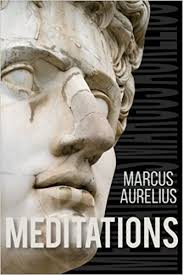Meditations Page #27
Meditations is a series of personal writings by Marcus Aurelius, Roman Emperor from 161 to 180 AD, recording his private notes to himself and ideas on Stoic philosophy. Marcus Aurelius wrote the 12 books of the Meditations in Koine Greek as a source for his own guidance and self-improvement.
XV. Is any man so foolish as to fear change, to which all things that once were not owe their being? And what is it, that is more pleasing and more familiar to the nature of the universe? How couldst thou thyself use thy ordinary hot baths, should not the wood that heateth them first be changed? How couldst thou receive any nourishment from those things that thou hast eaten, if they should not be changed? Can anything else almost (that is useful and profitable) be brought to pass without change? How then dost not thou perceive, that for thee also, by death, to come to change, is a thing of the very same nature, and as necessary for the nature of the universe? XVI. Through the substance of the universe, as through a torrent pass all particular bodies, being all of the same nature, and all joint workers with the universe itself as in one of our bodies so many members among themselves. How many such as Chrysippus, how many such as Socrates, how many such as Epictetus, hath the age of the world long since swallowed up and devoured? Let this, be it either men or businesses, that thou hast occasion to think of, to the end that thy thoughts be not distracted and thy mind too earnestly set upon anything, upon every such occasion presently come to thy mind. Of all my thoughts and cares, one only thing shall be the object, that I myself do nothing which to the proper constitution of man, (either in regard of the thing itself, or in regard of the manner, or of the time of doing,) is contrary. The time when thou shalt have forgotten all things, is at hand. And that time also is at hand, when thou thyself shalt be forgotten by all. Whilst thou art, apply thyself to that especially which unto man as he is a mart, is most proper and agreeable, and that is, for a man even to love them that transgress against him. This shall be, if at the same time that any such thing doth happen, thou call to mind, that they are thy kinsmen; that it is through ignorance and against their wills that they sin; and that within a very short while after, both thou and he shall be no more. But above all things, that he hath not done thee any hurt; for that by him thy mind and understanding is not made worse or more vile than it was before. XVII. The nature of the universe, of the common substance of all things as it were of so much wax hath now perchance formed a horse; and then, destroying that figure, hath new tempered and fashioned the matter of it into the form and substance of a tree: then that again into the form and substance of a man: and then that again into some other. Now every one of these doth subsist but for a very little while. As for dissolution, if it be no grievous thing to the chest or trunk, to be joined together; why should it be more grievous to be put asunder? XVIII. An angry countenance is much against nature, and it is oftentimes the proper countenance of them that are at the point of death. But were it so, that all anger and passion were so thoroughly quenched in thee, that it were altogether impossible to kindle it any more, yet herein must not thou rest satisfied, but further endeavour by good consequence of true ratiocination, perfectly to conceive and understand, that all anger and passion is against reason. For if thou shalt not be sensible of thine innocence; if that also shall be gone from thee, the comfort of a good conscience, that thou doest all things according to reason: what shouldest thou live any longer for? All things that now thou seest, are but for a moment. That nature, by which all things in the world are administered, will soon bring change and alteration upon them, and then of their substances make other things like unto them: and then soon after others again of the matter and substance of these: that so by these means, the world may still appear fresh and new. XIX. Whensoever any man doth trespass against other, presently consider with thyself what it was that he did suppose to be good, what to be evil, when he did trespass. For this when thou knowest, thou wilt pity him thou wilt have no occasion either to wonder, or to be angry. For either thou thyself dust yet live in that error and ignorance, as that thou dust suppose either that very thing that he doth, or some other like worldly thing, to be good; and so thou art bound to pardon him if he have done that which thou in the like case wouldst have done thyself. Or if so be that thou dost not any more suppose the same things to be good or evil, that he doth; how canst thou but be gentle unto him that is in an error? XX. Fancy not to thyself things future, as though they were present but of those that are present, take some aside, that thou takest most benefit of, and consider of them particularly, how wonderfully thou wouldst want them, if they were not present. But take heed withal, lest that whilst thou dust settle thy contentment in things present, thou grow in time so to overprize them, as that the want of them (whensoever it shall so fall out) should be a trouble and a vexation unto thee. Wind up thyself into thyself. Such is the nature of thy reasonable commanding part, as that if it exercise justice, and have by that means tranquillity within itself, it doth rest fully satisfied with itself without any other thing. XXI. Wipe off all opinion stay the force and violence of unreasonable lusts and affections: circumscribe the present time examine whatsoever it be that is happened, either to thyself or to another: divide all present objects, either in that which is formal or material think of the last hour. That which thy neighbour hath committed, where the guilt of it lieth, there let it rest. Examine in order whatsoever is spoken. Let thy mind penetrate both into the effects, and into the causes. Rejoice thyself with true simplicity, and modesty; and that all middle things between virtue and vice are indifferent unto thee. Finally, love mankind; obey God. XXII. All things (saith he) are by certain order and appointment. And what if the elements only. It will suffice to remember, that all things in general are by certain order and appointment: or if it be but few. And as concerning death, that either dispersion, or the atoms, or annihilation, or extinction, or translation will ensue. And as concerning pain, that that which is intolerable is soon ended by death; and that which holds long must needs be tolerable; and that the mind in the meantime (which is all in all) may by way of interclusion, or interception, by stopping all manner of commerce and sympathy with the body, still retain its own tranquillity. Thy understanding is not made worse by it. As for those parts that suffer, let them, if they can, declare their grief themselves. As for praise and commendation, view their mind and understanding, what estate they are in; what kind of things they fly, and what things they seek after: and that as in the seaside, whatsoever was before to be seen, is by the continual succession of new heaps of sand cast up one upon another, soon hid and covered; so in this life, all former things by those which immediately succeed.
Translation
Translate and read this book in other languages:
Select another language:
- - Select -
- 简体中文 (Chinese - Simplified)
- 繁體中文 (Chinese - Traditional)
- Español (Spanish)
- Esperanto (Esperanto)
- 日本語 (Japanese)
- Português (Portuguese)
- Deutsch (German)
- العربية (Arabic)
- Français (French)
- Русский (Russian)
- ಕನ್ನಡ (Kannada)
- 한국어 (Korean)
- עברית (Hebrew)
- Gaeilge (Irish)
- Українська (Ukrainian)
- اردو (Urdu)
- Magyar (Hungarian)
- मानक हिन्दी (Hindi)
- Indonesia (Indonesian)
- Italiano (Italian)
- தமிழ் (Tamil)
- Türkçe (Turkish)
- తెలుగు (Telugu)
- ภาษาไทย (Thai)
- Tiếng Việt (Vietnamese)
- Čeština (Czech)
- Polski (Polish)
- Bahasa Indonesia (Indonesian)
- Românește (Romanian)
- Nederlands (Dutch)
- Ελληνικά (Greek)
- Latinum (Latin)
- Svenska (Swedish)
- Dansk (Danish)
- Suomi (Finnish)
- فارسی (Persian)
- ייִדיש (Yiddish)
- հայերեն (Armenian)
- Norsk (Norwegian)
- English (English)
Citation
Use the citation below to add this book to your bibliography:
Style:MLAChicagoAPA
"Meditations Books." Literature.com. STANDS4 LLC, 2025. Web. 26 Feb. 2025. <https://www.literature.com/book/meditations_76>.








Discuss this Meditations book with the community:
Report Comment
We're doing our best to make sure our content is useful, accurate and safe.
If by any chance you spot an inappropriate comment while navigating through our website please use this form to let us know, and we'll take care of it shortly.
Attachment
You need to be logged in to favorite.
Log In